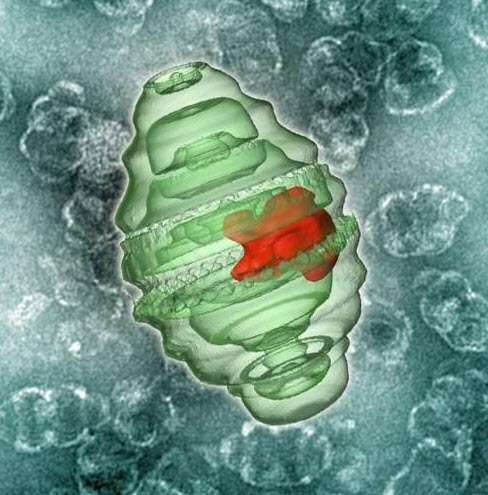Nanoparticle vaults deliver drugs that stimulate the immune system to fight cancer
May 4, 2011
Scientists at UCLA’s Jonsson Comprehensive Cancer Center have discovered a way to wake up the immune system to fight cancer by delivering an immune system-stimulating protein in a “nanoscale vault” directly into lung cancer tumors, harnessing the body’s natural defenses to fight disease growth.
The vaults are barrel-shaped nanoscale capsules found in the cytoplasm of all mammalian cells.
They were engineered to slowly release a protein, the chemokine CCL21, into the tumor. Pre-clinical studies in mice with lung cancer showed that the protein stimulated the immune system to recognize and attack the cancer cells, potently inhibiting cancer growth.
The new vault delivery system is based on a 10-year, ongoing research effort focusing on using a patient’s white blood cells to create dendritic cells, which are cells of the immune system that process antigen material and present it on the surface to other immune system cells.
The first phase of the research used a replication-deficient adenovirus to infect the dendritic cells and prompt them to over-secrete CCL21. Ten million engineered cells at a time were then injected directly into the patient’s lung cancer to stimulate an immune response.
The researchers showed that the dendritic cell method is safe, has no side effects, and seems to boost the immune response. They found T lymphocytes circulating in the bloodstream with specific cytokine signatures, indicating that the lymphocytes were recognizing the cancer as a foreign invader.
However, it took more than a week to differentiate the white blood cells into dendritic cells and let them grow to the millions required for the therapy. The dendritic cells were infected with a virus engineered to carry a gene that caused the cells to secrete CCL21 and then injected into the patient’s tumor using guided imaging.
During the second phase of the research, the scientists decided to replace the dendritic cells with a nano-vehicle to deliver the CCL21, an easier and less expensive treatment. The vault nanoparticles containing the CCL21 were engineered to slowly release the protein into the tumor over time, producing an enduring immune response. Although the vaults protect the packed CCL21, they act like a time-release capsule, the researchers said.
The researchers plan to test the vault delivery method in human studies within the next three years, the first time a vault nanoparticle will be used in humans for a cancer immunotherapy.
Only a single injection into the tumor of the vault nanoparticle would be required. because of the slow-release design, the researchers said. Eventually it could be designed to be patient-specific by adding the individual’s tumor antigens into the vault.
The vaults could also be targeted by adding antibodies to their surface that recognize receptors on the tumor. The injection would then be delivered into the bloodstream and the vault would navigate to the tumor, a less invasive process that would be easier on the patients. The vault could also seek out and target tumors and metastases too small to be detected with imaging.
Because a vault is naturally occurring particle, it causes no harm to the body and is potentially an ideal vehicle for use in delivery of personalized therapies, the researchers said.
Ref: Upendra K. Kar, Minu K. Srivastava, Asa Andersson, Felicita Baratelli, Min Huang, Valerie A. Kickhoefer, Steven M. Dubinett, Leonard H. Rome, Sherven Sharma, Novel CCL21-Vault Nanocapsule Intratumoral Delivery Inhibits Lung Cancer Growth, PLoS ONE, 2011; 6 (5): e18758 DOI: 10.1371/journal.pone.0018758
